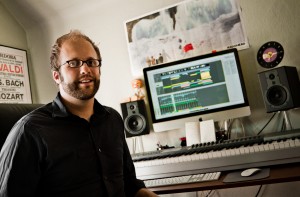 Erik here…As the resident video editor here at Chase Jarvis Inc, I’m on a never ending search for music. Often times the music drives the edit. The rhythm of the music can have a huge influence on the pace for the cuts and the mood can make a hilarious moment tragic. In other instances I get the luxury of having custom music created which is based on my edit of the footage. When that opportunity presents itself, we reach out to skilled composer and our frequent collaborator, McKenzie Stubbert. Most recently he created the music for our ‘Dasein: The Art of Being’ documentary. While putting the finishing touches on the score in his Portland studio, I seized the opportunity to pick his brain a little about what he does.
Erik here…As the resident video editor here at Chase Jarvis Inc, I’m on a never ending search for music. Often times the music drives the edit. The rhythm of the music can have a huge influence on the pace for the cuts and the mood can make a hilarious moment tragic. In other instances I get the luxury of having custom music created which is based on my edit of the footage. When that opportunity presents itself, we reach out to skilled composer and our frequent collaborator, McKenzie Stubbert. Most recently he created the music for our ‘Dasein: The Art of Being’ documentary. While putting the finishing touches on the score in his Portland studio, I seized the opportunity to pick his brain a little about what he does.
How did this become a career for you? What’s your musical background?
I started music/piano lessons at around four years old. With the combination of supportive parents who encouraged and paid for lessons and a school system that still had money for music, I was able to get a lot of opportunities to practice and perform. After high school I went to music school and got a fairly formal education focused on composition. After that I had to teach myself the technological and business side of being a composer who can earn a living. They didn’t teach me those things in college. Add that on top of a basic natural ability for music and voracious appetite for all forms of art and…ta-dah!
How would you describe your “sound”?
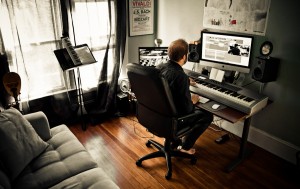 I’m still working on this and in a way hope that I never firmly land and stay anywhere. At one point a friend described what I write as “sad clown music” with “twinkles”. While I haven’t written circus music in a while, I’m still drawn to more melancholy harmonies and icy/metallic textures. But, as a commercial composer, I try to be versatile and write to the needs of the creative goal. Sometimes that means writing something quite different from what I would normally write for myself.
I’m still working on this and in a way hope that I never firmly land and stay anywhere. At one point a friend described what I write as “sad clown music” with “twinkles”. While I haven’t written circus music in a while, I’m still drawn to more melancholy harmonies and icy/metallic textures. But, as a commercial composer, I try to be versatile and write to the needs of the creative goal. Sometimes that means writing something quite different from what I would normally write for myself.
What are the various ways you get hired? How do you market yourself?
The adage “you’ve gotta know a guy” is still true. This translates into trying to get to know a lot of people.
At one point, I spent about a month solid calling and emailing people around the country trying to get them to check out my work. It netted about a 1% return. I’ve found that it’s very important to have good work and a clean website with which to share. My good friend Jason Glaspey (interactive wizard) told me that “your website needs to tell a story and, in this case, the story is: ‘I am good at what I do. I am available for hire and here are some examples of work I’ve done, and people I’ve worked with. When you’re ready to hire me, here’s how to get in touch.'” His advice helped me focus everything about my approach.
I still have to contact a lot of people. Looking for work doesn’t really ever stop But, the more projects I work on, the more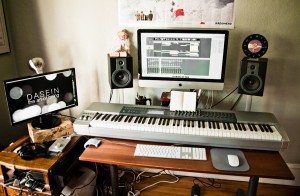 people become familiar with my work and no longer need to be convinced that I’m good enough at what I do to be hired.
people become familiar with my work and no longer need to be convinced that I’m good enough at what I do to be hired.
I’m certainly guilty of coming to you on several occasions with my hat in my hands, hoping you’ll compose some magic for a project with a challenging budget or timeframe, how do you decide what projects are worth your time and effort?
With every project there are three possibilities:
1) The people are good.
2) The project is good.
3) The money is good.
I have to have two of those to take the job. This isn’t a philosophy of my own invention but one that I try to abide by.
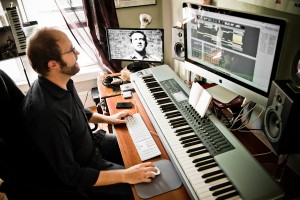 Talking specifically about our Dasein documentary, what about that video made you want to take it on?
Talking specifically about our Dasein documentary, what about that video made you want to take it on?
I’m always looking for projects that are so good that if I saw it later and didn’t work on it I would be really annoyed. Also, I’m a sucker for slo-mo b/w film of New York. Chase and Co make pretty pictures that are hard to resist.
What’s your process like? Where do you start? Do you start writing right away or do you allow time for the content to simmer?
How much time I spend before I start writing is directly related to how much time there is before the music is due. Each project is essentially a puzzle which needs the right sounding piece to fit in the space. In designing the piece I have to decide what the sound should be. What is the vibe/groove/feel/etc?. The real writing often doesn’t start until I’ve solved this problem.
I’m always impressed by your ability to take your musical cues from moments in films that I never expected. Can you give some examples of that in the Dasein video?
The Dasein logo that spreads out was an obvious “hit point”. It was actually my wife who said, “I want to hear a deep sound like a helicopter there”. That ended up shaping the pulsing sound that kind of anchors the entire piece. Also, the nature of the slo-mo b/w footage suggested a kind of dream was happening. Almost as if Chase is talking and remembering everything that you are seeing.
What equipment do you use to compose your music?
I use a Radio Shack tape recorder and make every sound you hear with my mouth and a piece of wax paper.
And…Apple Logic and myriad of virtual instruments. The Kontakt player is pretty vital to me.
How do you figure pricing/licensing for your work?
Usage is key. A 30 second spot for a tiny website is going to cost way less than a 30 second national TV spot. But that cost always seems to change. It would be much easier if there was a national index I could consult every morning like I was selling gold. Well…I am selling gold, but just not the kind that everyone can agree on. Music has value only 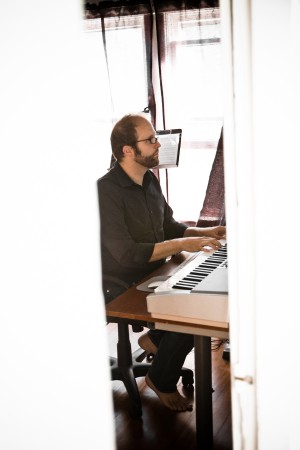 when everyone agrees on it. It can be tricky to know what that is because people are essentially guessing based on their previous guess, then using that new guess as the precedent for the next guess. All that to say I try to do my best to come up with a number that’s fair to all involved.
when everyone agrees on it. It can be tricky to know what that is because people are essentially guessing based on their previous guess, then using that new guess as the precedent for the next guess. All that to say I try to do my best to come up with a number that’s fair to all involved.
What advice can you give about maintaining relationships with clients and collaborators?
Frank Zappa said “talking about music is like dancing about architecture.” Being that the very subject of my work is often hard to discuss, I try to be as clear as possible when it comes to every other aspect of my work. Before I send off every email to a client I ask myself…am I being/have they been clear? Clarity of language is key for me. It’s important for me to document what decisions are being made at every step so we can refer to those as we go along the process of the project. I also try to remember that this isn’t a commissioned work of art. What I’m doing has to serve not only the project, but the client’s desires for the project. I find that when I convey that goal to my clients, they trust my instincts a bit more.
For a refresher of what McKenzie does, give Dasein: The Art of Being a LISTEN:



















A great interview with a local composer. I love hearing about people’s creative processes and the gear they use, especially music composition. Looking forward to more.
Awesome post
We camped in the backyard as kids! Right on McKenzie! great to hear your work. Say hi to Courtney..